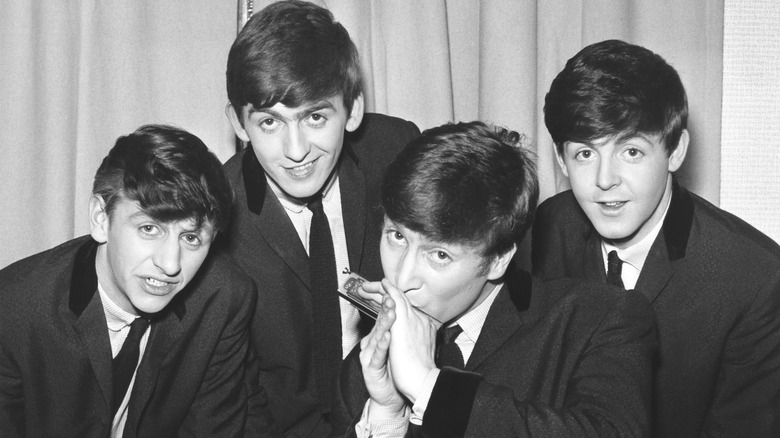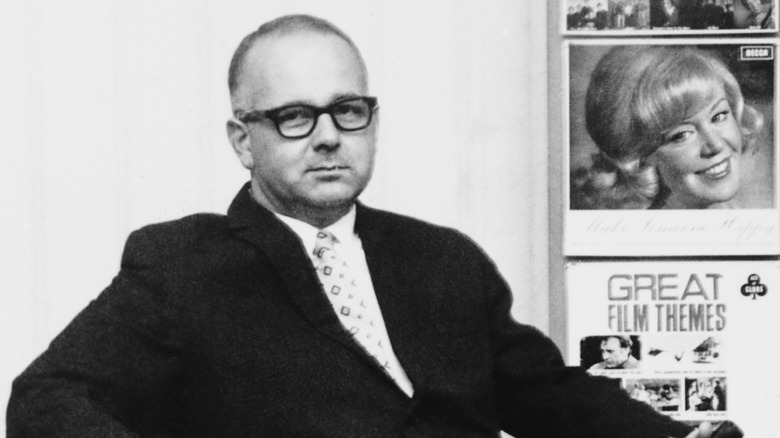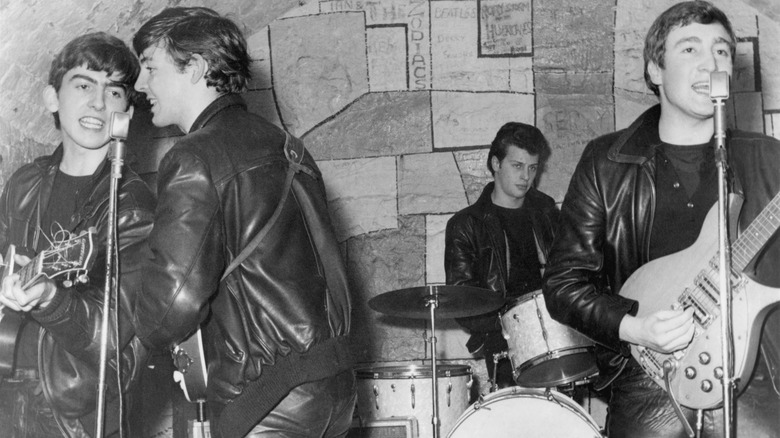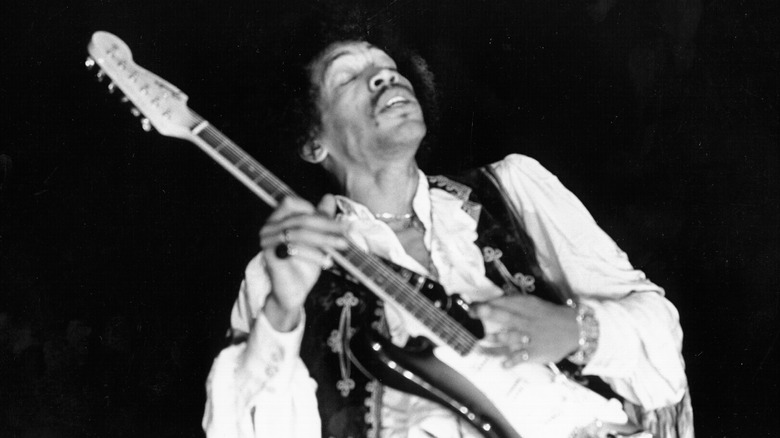The Beatles And Jimi Hendrix Were Both Turned Down By The Same Executive
We don't need to remind anyone at this point of how the Beatles revolutionized popular music from the moment their performance on "The Ed Sullivan Show" became the February 1964 equivalent of "breaking the internet" or going viral via TikTok in present times. Over a six-year period that came to an unfortunate end in 1970, the Fab Four reinvented themselves in so many ways but never stopped topping the charts or influencing legions of young people to pick up some musical instruments and start a band.
Amid one of those periods of reinvention, psychedelic rock started gaining prominence as a popular sub-genre, and U.K.-based (at least at the time of his big break) American guitarist Jimi Hendrix was at the forefront of this new movement. The Seattle native did things with the guitar that virtually no other axeman before him was able to do, and while many of his most famous recordings were his own originals, he had a knack for adding his own unique twist to the songs he covered, with Bob Dylan's "All Along the Watchtower" and "Like a Rolling Stone" being prime examples.
The Beatles and Hendrix wouldn't have been so successful if they hadn't ended up with the right label, but you might be surprised to know that there was one record executive who rejected both acts back when they were still on the verge of breaking out as rock stars.
Decca exec Dick Rowe rejected the Beatles after their audition with the label
It may sound preposterous to anyone considering the situation with decades of hindsight — why would someone turn down a highly influential band that would go on to sell millions of records and remain beloved by fans well after their breakup? Decca Records A&R head Dick Rowe (pictured above) had his reasons for saying no to the Beatles, then with Pete Best as their drummer, though we'll get to that in a bit.
On New Year's Day, 1962, the Beatles, then a local sensation in Liverpool but largely unknown outside of their hometown, auditioned for Decca at the label's studio — according to the Beatles Bible, this came about two weeks and a half after Decca A&R representative Mike Smith caught them playing a show at the Cavern Club. Unfortunately, Smith showed up late at the audition and further took the Beatles out of their comfort zone by asking them to use Decca's own amplifiers. However, after recording 15 songs, most of them being covers, the band had high hopes that Decca would offer them a record deal.
Sure, they were nervous, as just about any young band would be while trying out for a major record label, but the overall feeling was that the audition went well. As it turned out, it didn't, and that was because Decca chose to sign another up-and-coming act over the future Fab Four.
Rowe allegedly believed guitar groups were 'on the way out'
As explained by the Beatles Bible, there was another young band that auditioned at the Decca Records studios at the very start of 1962 — Brian Poole and the Tremeloes, who would later enjoy some stateside success after Poole left the group. According to Dick Rowe, he and Mike Smith chose to sign the Tremeloes over the Beatles because of geography. Poole's band was based in the East London town of Dagenham, which meant they were closer to Decca headquarters, thus allowing the label to work more closely with them.
However, the reason most Beatles fans remember has nothing to do with the fact that the Tremeloes were a London band. Rowe has often been quoted as telling Beatles manager Brian Epstein that "guitar groups are on the way out," and Epstein himself recalled the A&R head telling him this in his 1964 autobiography (via The Independent). But Rowe consistently denied this story until his death in 1986, and if you come to think of it, Brian Poole and the Tremeloes were — you guessed it — a guitar group. Furthermore, he did make up for his misjudgment of the Beatles' hitmaking potential (and guitar groups in general, if Epstein's claims were accurate) by signing another band from London that had an even heavier guitar sound than the Fab Four. Ever heard of a band called the Rolling Stones?
Rowe also wasn't impressed with two of Jimi Hendrix's most famous songs
Although it's nowhere as well-documented a story as that of how he became the "man who turned down the Beatles," the story of how Dick Rowe passed on Jimi Hendrix is also worth mentioning. After all, it's not every day that you see a record executive, for all his successes, miss out on two of the most influential rock acts of a given decade.
According to John McDermott's 1992 biography "Hendrix: Setting the Record Straight," the musician's co-manager, Michael Jeffery, was on a mission in late 1966 to let England's record labels know that a talented guitarist had come all the way from America and was worthy of a recording contract. His first stop was with Decca Records, and once again, Rowe allegedly seemed unimpressed with what he was hearing — to be specific, he got to hear Hendrix's original composition "Stone Free" and his version of the rock standard "Hey Joe." Both songs went on to become classics, and for the second time in less than five years, Rowe had whiffed big-time in his judgment of talent.
Decca's loss was Track Records' gain, as the label, which was run by The Who's managers Kit Lambert and Chris Stamp, snapped Hendrix up soon after the Decca rejection. "Hey Joe" would peak at No. 6 on the U.K. singles charts in January 1967, and would be the first of many more U.K. hits to come for the singer-guitarist.



